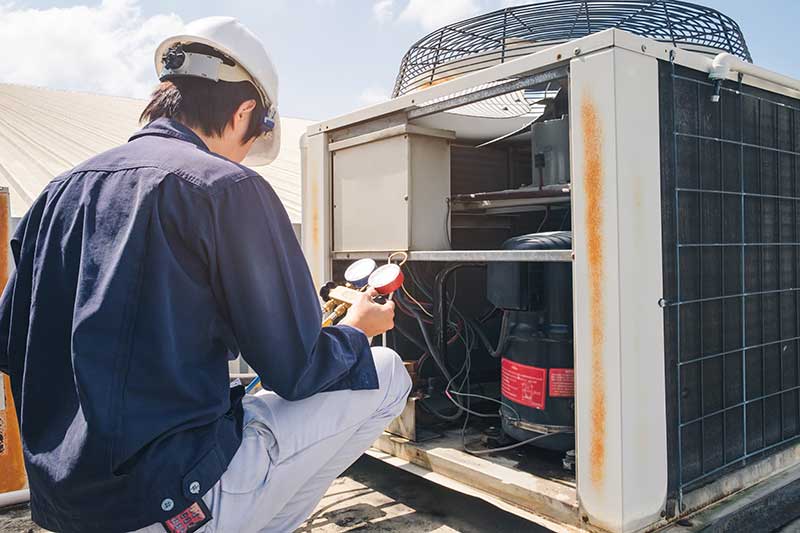Explore the comprehensive HVAC Technician job description. Learn about the roles, responsibilities, and essential qualifications needed for this dynamic and essential career path. Heating, Ventilation, and Air Conditioning (HVAC) technicians are the unsung heroes of comfort and safety in indoor environments.
As we increasingly rely on these systems to keep us warm in winter, cool in summer, and breathe healthy air year-round, the importance of skilled HVAC technicians cannot be overstated. This article describes the roles, responsibilities, and qualifications required for this indispensable profession. Are you looking for a detailed HVAC Technician job description? Find comprehensive information on the roles, responsibilities, and qualifications needed for an HVAC career. Ideal for employers and candidates.
HVAC Technician Job Description: Roles, Responsibilities, and Qualifications
Learn what it takes to become a successful HVAC technician. Discover the roles, responsibilities, and qualifications required for a career in heating, ventilation, and air conditioning services. Explore our in-depth HVAC technician job description for all details.
Roles of an HVAC Technician
HVAC technicians play a vital role in installing, maintaining, and repairing heating, cooling, and air conditioning systems. They are involved in ensuring the functionality of these systems in residential homes, commercial buildings, and industrial facilities. The job of an HVAC technician is multidimensional, combining practical skills with technical knowledge.
Installation
A significant part of an HVAC technician’s role is the installation of new heating, cooling, and air conditioning systems. This process involves:
- Interpreting blueprints and building specifications to map out installation.
- Installing components such as compressors, motors, piping, and ducts.
- Connecting systems to fuel and water supply lines, air ducts, and other components.
- Testing individual components to ensure proper installation and operation.
Maintenance
Routine maintenance is critical for the longevity and efficiency of HVAC systems, which includes tasks such as:
- Inspect and maintain HVAC systems to ensure they operate efficiently.
- Cleaning ducts and filters and checking for leaks.
- Refilling refrigerants, lubricating parts, and fixing drainages.
- Adjusting system controls for optimizing system performance.
Repair
When systems break down, HVAC technicians must quickly diagnose issues and make repairs, which can involve:
- Troubleshooting systems and identifying problems.
Replacing or repairing defective parts. - Performing emergency repairs while ensuring compliance with safety standards.
- Advising owners on the upkeep and when it is time for replacement.
Responsibilities of an HVAC Technician
While installation, maintenance, and repair are the core aspects of an HVAC technician’s day-to-day job, there is a host of other responsibilities that they must shoulder:
- Ensuring compliance with all applicable HVAC codes and maintaining a safe work environment.
- Provided excellent customer service and communicated effectively with clients to understand their needs and concerns.
- Keeping detailed records of work performed and parts used.
Staying current with advances in HVAC technology and best practices. - Managing inventory of company-provided tools and equipment.
Qualifications for an HVAC Technician
Becoming an HVAC technician requires education, training, and certification. Below are the standard qualifications for the role:
Education
- A high school diploma or equivalent is usually required.
- Post-secondary education in HVAC technology from a vocational school or community college is beneficial.
- Some apprenticeship programs combine classroom study with on-the-job training.
Training and Apprenticeship
- Apprenticeships typically last three to five years, allowing new technicians to learn while earning.
- Apprentices gain experience with basic tasks under the guidance of experienced technicians.
- In addition to on-the-job training, apprentices usually complete a set number of hours in the classroom.
Licensure and Certification
- Some states require HVAC technicians to have a license to practice. This can entail passing an exam that tests knowledge of electrical circuits, HVAC system design, and local HVAC codes.
- Various certifications are available through organizations such as the North American Technician Excellence (NATE) organization or the Environmental Protection Agency (EPA), which has certification processes for handling refrigerants.
- Additional endorsements for specialty areas like solar-powered HVAC systems or commercial refrigeration can be attained.
Required Skills and Proficiencies
- Mechanical skills: Familiarity with HVAC components and systems and the ability to disassemble and reassemble complex systems.
- Troubleshooting skills: Identifying problems and determining how to correct them.
- Attention to detail: Ensuring all installations, maintenance, and repairs meet legal standards.
- Physical stamina and strength: Handling heavy equipment and working in cramped or uncomfortable positions.
- Customer-service skills: To educate and communicate with customers about their HVAC systems.
Work Environment
The work environment for HVAC technicians can vary greatly, from homes, schools, hospitals, office buildings, or factories. Technicians often work in outdoor settings, adverse weather, or tight spaces. Because HVAC systems operate around the clock, technicians sometimes work evenings and weekends and may be on call for emergencies.
Career Outlook and Salary
The job market for HVAC technicians is favorable, with growing demand due to new construction, the increasing complexity of HVAC systems, and an emphasis on energy efficiency and reducing pollution. According to the U.S. Bureau of Labor Statistics (BLS), the median annual wage for HVAC mechanics and installers was $51,390 in May 2022.
How Do I Become An HVAC Technician at ATA College?
ATA College is an excellent place to start if you want to become an HVAC technician. Their HVAC technician school offers comprehensive training in heating, ventilation, and air conditioning systems. You’ll learn the ins and outs of HVAC technology from experienced professionals in a hands-on learning environment.
ATA’s program covers theory and practical application, providing you with the skills necessary to succeed in the industry. Plus, with an emphasis on job placement, you’ll be on your way to a fulfilling career in no time. You can start your journey to becoming an HVAC technician today at ATA College.
Conclusion
The role of an HVAC technician is challenging but rewarding, with a positive job outlook and opportunities for career growth and specialization. Professionals in the field must be willing to learn and adapt to new technologies and regulations continuously. An HVAC career could be the right fit for those who take pride in practical problem-solving, hands-on work, and providing essential services that contribute to individuals’ comfort and well-being.





